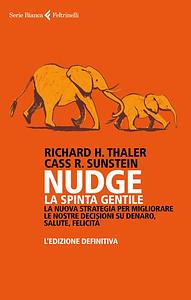You need to sign in or sign up before continuing.
Take a photo of a barcode or cover
informative
reflective
medium-paced
informative
reflective
medium-paced
Interesting and insightful into alternative public policy and social choice solutions
9/10
Since reading Thinking, Fast & Slow, I've taken a keen interest in Behavioural Economics. I've already read Misbehaving by Thaler, and since I enjoyed his writing so much (he's really funny and engaging), I decided to give Nudge a shot.
Important notes:
Definition: "A nudge is an aspect of choice architecture that will later alter our behavior/choice without forbidding any options or significantly changing economic incentives."
Libertarian-Paternalism: Where private and public institutions can affect behavior while still respecting freedom of choice
- Nudges can be used to alter someone's behavior, leading them to make the best choice for themselves, without taking away their freedom to choose
Review:
For the most part, I really enjoyed Nudge.
Thaler and Sunstein essentially argue that nudges, when used ethically, can help the betterment of society. Public and private institutions can employ choice architects to help nudge us into making better decisions for ourselves -- without taking away our freedom of choice.
Likes:
Thaler and Sunstein's points were well articulated throughout the book, frequently using examples of in different areas of life (financially, socially, politically, economically, and physically)
I really liked that they used examples where nudges were non-existent and how they could've helped, but they also used examples of nudges gone wrong and what should've been done instead.
I also really liked that the second last chapter of the book was dedicated to any counter-arguments one may have towards nudges and libertarian paternalism, in which they debunked each argument. Not only did this chapter help clear up my criticism and confusion, but I thought that it was a nice touch of transparency that you don't get often with non-fic books.
Thaler and Sunstein aren't saying "this is the right way of doing things"; they're saying "this could potentially be the better way of doing things and here's why:" which I LOVED because nothing bothers me more than a know-it-all Author.
Ok now here are my dislikes:
- Redundancy. For example, I think there were a solid 3-4 chapters that drew the same conclusion: too much choice is bad for consumers because they typically end up choosing the worst one, even with nudges.
- I'd be lying if I said I wasn't bored at times. Some chapters were more interesting than others, but I'd say 80% of the book was really interesting and fun, and the other 20% honestly bored me.
- Focused a lot on American issues, policies, and politics (however, I guess it makes sense considering that the authors are American -- but still. Nudging isn't exclusive to the USA).
- The cover makes you think that it's a how-to book on decision-making in different areas of your life, but it's not. It focuses on society as a whole as opposed to the individual.
Since reading Thinking, Fast & Slow, I've taken a keen interest in Behavioural Economics. I've already read Misbehaving by Thaler, and since I enjoyed his writing so much (he's really funny and engaging), I decided to give Nudge a shot.
Important notes:
Definition: "A nudge is an aspect of choice architecture that will later alter our behavior/choice without forbidding any options or significantly changing economic incentives."
Libertarian-Paternalism: Where private and public institutions can affect behavior while still respecting freedom of choice
- Nudges can be used to alter someone's behavior, leading them to make the best choice for themselves, without taking away their freedom to choose
Review:
For the most part, I really enjoyed Nudge.
Thaler and Sunstein essentially argue that nudges, when used ethically, can help the betterment of society. Public and private institutions can employ choice architects to help nudge us into making better decisions for ourselves -- without taking away our freedom of choice.
Likes:
Thaler and Sunstein's points were well articulated throughout the book, frequently using examples of in different areas of life (financially, socially, politically, economically, and physically)
I really liked that they used examples where nudges were non-existent and how they could've helped, but they also used examples of nudges gone wrong and what should've been done instead.
I also really liked that the second last chapter of the book was dedicated to any counter-arguments one may have towards nudges and libertarian paternalism, in which they debunked each argument. Not only did this chapter help clear up my criticism and confusion, but I thought that it was a nice touch of transparency that you don't get often with non-fic books.
Thaler and Sunstein aren't saying "this is the right way of doing things"; they're saying "this could potentially be the better way of doing things and here's why:" which I LOVED because nothing bothers me more than a know-it-all Author.
Ok now here are my dislikes:
- Redundancy. For example, I think there were a solid 3-4 chapters that drew the same conclusion: too much choice is bad for consumers because they typically end up choosing the worst one, even with nudges.
- I'd be lying if I said I wasn't bored at times. Some chapters were more interesting than others, but I'd say 80% of the book was really interesting and fun, and the other 20% honestly bored me.
- Focused a lot on American issues, policies, and politics (however, I guess it makes sense considering that the authors are American -- but still. Nudging isn't exclusive to the USA).
- The cover makes you think that it's a how-to book on decision-making in different areas of your life, but it's not. It focuses on society as a whole as opposed to the individual.
informative
inspiring
informative
A great little piece of pop science that makes nudging accessible and easily appreciably, a key stone in introduction to modern social studies
informative
slow-paced
informative
reflective
medium-paced
Nudge falls into the (large) category of non-fiction books where the key points are made in the first 50-100 pages and the remainder of the book is made up of examples of varying quality intended to drive home the point.
In this case, the key point concerns the notion of "choice architecture" or the impact of defaults, information disclosure, and alignment of incentives to improve our ability to make complex decisions despite rarely performing a full rational analysis on them. The authors argue in favor of the idea of "libertarian paternalism", the notion that people should be guided towards the choice that is objectively best for them while maintaining their option to make a different decision. They suggest this approach as a reasonable middle ground between strict government mandates and throwing people into the deep end of complex decisions like investments and health care plans. I'm sympathetic to this line of reasoning since it maintains individual freedom while acknowledging the fact that most people don't bother exercising that freedom. Since there's always going to be a choice of some kind (including doing nothing), we might as well default people into an option that will be better than what they might otherwise get.
While some of the examples provide hit the nail on the head, including the classic example of making 401k plans opt-in vs. opt-out, two challenges emerge as the book progresses:
1) Choice architecture is only feasible when policy makers can agree on what the goals of the architecture should be. Usually, differences in policy aren't simply a matter of whether a particular behavior should be mandated or just "encouraged" but whether the behavior is desirable or not. The chapter on the environment suffered from this problem. So long as there isn't a political consensus about whether global warming is actually an issue, it seems premature to talk about how you might nudge people in one way or the other.
2) Some of the examples seemed only tangentially related to the premise of the book. The discussion of marriage, for instance, seemed to be first and foremost a libertarian argument, with a little bit of choice architecture thrown in towards the end to tie it back to the central point. It was hard not to feel like this chapter was a combination of filler and the authors taking advantage of their soapbox to make an argument that is only somewhat related to their book.
My recommendation would be to read the early chapters to get the core point and the research that backs it up, and then skip to the examples that you're particularly interested in.
In this case, the key point concerns the notion of "choice architecture" or the impact of defaults, information disclosure, and alignment of incentives to improve our ability to make complex decisions despite rarely performing a full rational analysis on them. The authors argue in favor of the idea of "libertarian paternalism", the notion that people should be guided towards the choice that is objectively best for them while maintaining their option to make a different decision. They suggest this approach as a reasonable middle ground between strict government mandates and throwing people into the deep end of complex decisions like investments and health care plans. I'm sympathetic to this line of reasoning since it maintains individual freedom while acknowledging the fact that most people don't bother exercising that freedom. Since there's always going to be a choice of some kind (including doing nothing), we might as well default people into an option that will be better than what they might otherwise get.
While some of the examples provide hit the nail on the head, including the classic example of making 401k plans opt-in vs. opt-out, two challenges emerge as the book progresses:
1) Choice architecture is only feasible when policy makers can agree on what the goals of the architecture should be. Usually, differences in policy aren't simply a matter of whether a particular behavior should be mandated or just "encouraged" but whether the behavior is desirable or not. The chapter on the environment suffered from this problem. So long as there isn't a political consensus about whether global warming is actually an issue, it seems premature to talk about how you might nudge people in one way or the other.
2) Some of the examples seemed only tangentially related to the premise of the book. The discussion of marriage, for instance, seemed to be first and foremost a libertarian argument, with a little bit of choice architecture thrown in towards the end to tie it back to the central point. It was hard not to feel like this chapter was a combination of filler and the authors taking advantage of their soapbox to make an argument that is only somewhat related to their book.
My recommendation would be to read the early chapters to get the core point and the research that backs it up, and then skip to the examples that you're particularly interested in.




